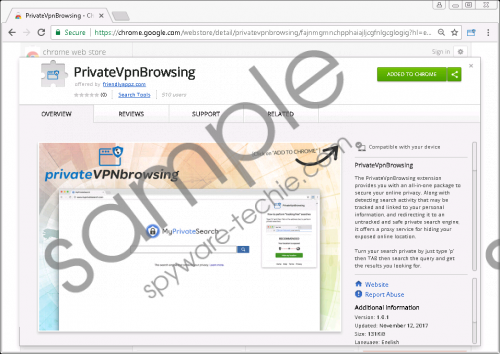Do you know what PrivateVPNBrowsing is?
PrivateVPNBrowsing is a browser extension that could change your default search engine and might show you untrustworthy advertisements. As a result, the tool falls under the classification of potentially unwanted programs (PUP). Our computer security specialists say such applications cannot be trusted and it might be safer for the system to remove them. Users who leave it unattended may risk encountering possible malicious ads that could be displayed among the search results, for example, pop-ups suggesting browser hijackers, other PUPs, or even malicious programs. Thus, if you would rather keep away from such content, we urge you to erase PrivateVPNBrowsing with no hesitation. Readers who need any help with the extension’s deletion could follow the steps available on our removal guide placed below this report. However, before sliding below, it is advisable to read the rest of the article and learn about this suspicious add-on more.
To begin with, it appears to be PrivateVPNBrowsing might be spread through suspicious pop-up ads or bundled setup files. This means the user may not necessarily seek to acquire it and yet could receive it. To be more accurate, the PUP might be suggested as an additional application on some program’s setup wizard. The problem with bundled installers it that some of them allow to deselect bundled tools only if the user chooses custom installation settings and if he does not, the suggestions get installed automatically. Because of this, it is quite possible some users could place this suspicious add-on on their browser without even realizing it. For this reason, our computer security specialists always recommend being cautious when launching installers downloaded from untrustworthy sources. Of course, the safest option would be picking legitimate sites instead. PrivateVPNBrowsing screenshot
PrivateVPNBrowsing screenshot
Scroll down for full removal instructions
Another thing we should mention is the extension appears to be compatible with Google Chrome, so if the user is browsing with any other program he should not encounter it. The user should notice PrivateVPNBrowsing soon after it gets in since the application may replace the browser’s default search engine. The new search tool may redirect the user to mps.eanswers.com/search and then into modified Yahoo search results. It is important to mention that even though the add-on’s description claims the user can surf the Internet without being tracked it does not seem to be entirely true. The PUP’s Privacy Policy states that upon installation the user could be asked to “log in to your account (it can be Google or Facebook account)” and so the extension might “collect your name, email address, country of origin, and, if you choose, your nickname, telephone number, website, company, and title.”
Furthermore, the mentioned paper says the anonymous or personal user’s data could be used to perform research “about your use of, or interest in, our products, services or content, or products, services or content offered by others.” The fact PrivateVPNBrowsing uses a modified search engine and collects various information about the user to perform the described analysis suggest the PUP might be showing third-party advertisements. Unfortunately, since the Privacy Policy paper states the developers do not take any responsibility for third-party content we fear some of it could be possibly dangerous, e.g., show fake lottery winnings, ask to participate in fictitious surveys, offer to install more unreliable applications or even malware, etc.
Given, PrivateVPNBrowsing provided search engine does not seem to be trustworthy and could show possibly malicious advertisements; it seems to us it would be smarter to eliminate it at once. For users who decide to do so, we recommend following the removal guide placed a bit below this paragraph. Readers who would like not just erase the PUP, but also check the whole system for more potential threats, should download a reputable antimalware tool of their preference and perform a full system scan. Such a tool may also help you keep the computer secure in the future too; all you have to do is keep it active and up to date.
Delete PrivateVPNBrowsing
- Launch Google Chrome.
- Tap ALT+F at the same time.
- Navigate to Settings and choose More tools.
- Select Extensions and locate PrivateVPNBrowsing.
- Tap the recycle bin button available next to the unwanted add-on.
- Click Remove and close the browser.
In non-techie terms:
PrivateVPNBrowsing may claim it provides a safe search engine that allows the user to browse the Internet without being tracked or in other words anonymously, but our computer security specialists doubt it can actually be of any use. After testing the extension’s provided search engine, we discovered it collects results with a modified search.yahoo.com variant. Because of this, it is quite possible the PUP could display third-party advertisements. Such content might be targeted as well since it seems the application might gather some information related to the user’s browsing. Also, the ads may come from unknown sources, which is why there are no guarantees they would be safe to interact with. Therefore, we would not recommend using this tool any longer. To erase it manually you could follow the removal guide provided a bit above this text. Lastly, if you fear of being tracked while browsing the Internet, you should just use the Google Chrome’s Incognito window.
